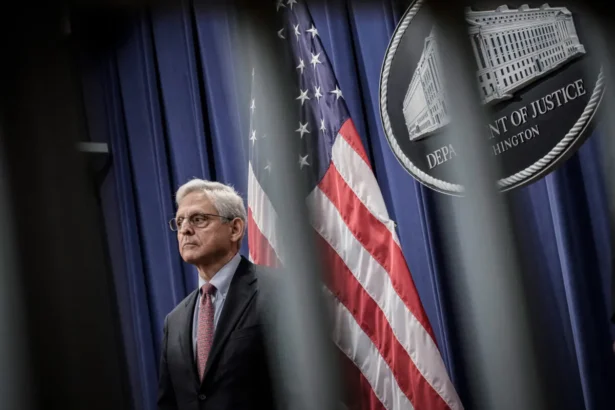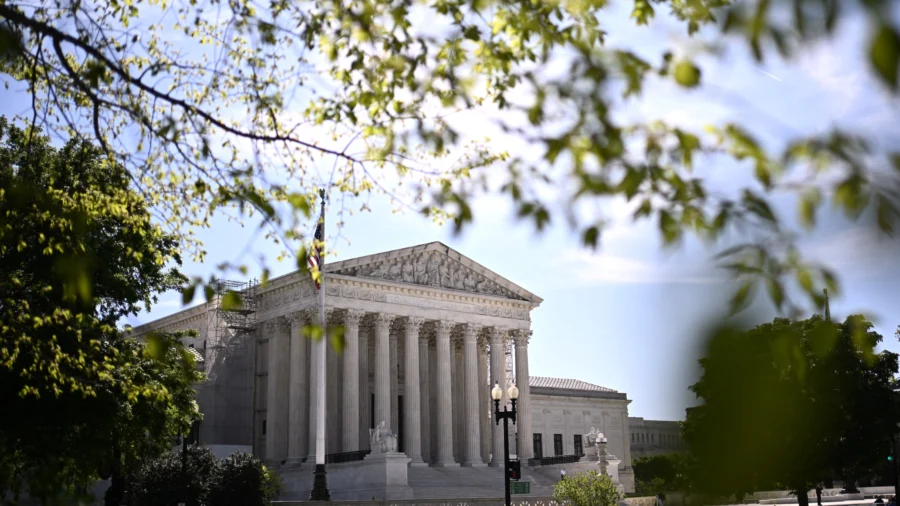The Biden administration is trying to create a federal right to abortion in a case about emergency health care standards that the Supreme Court will take up on April 24, Idaho’s attorney general and legal experts say.
Specifically, the case is about whether a state law that restricts abortion conflicts with a federal law that forbids “patient dumping,” the practice of hospitals refusing emergency treatment to people who can’t afford to pay for medical services.
The Biden administration says the state law runs afoul of the federal law, which requires that emergency room patients be provided stabilizing care, while Idaho argues the federal law and the state law are not in conflict. Idaho says the federal government is trying to stretch the reach of the federal law to override the state’s abortion law.
The case is coming up as the Supreme Court deliberates another abortion-related appeal, Food and Drug Administration v. Alliance for Hippocratic Medicine, which the court heard on March 26. A doctors’ group sued the Food and Drug Administration for loosening regulations pertaining to the abortion pill mifepristone, claiming the relaxation of the rules violates federal law.
Advocates for mifepristone say the current system for dispensing the drug is safe, while opponents say it puts women at risk by ignoring safety measures that used to be in place. The Supreme Court could rule on the case at any time.
The Idaho case goes back to 2020 when the state enacted the Defense of Life Act with a built-in triggering provision, allowing it to take effect if Roe v. Wade (1973) were ever overturned. The law took effect in 2022 after the Supreme Court ruled in Dobbs v. Jackson Women’s Health Organization. That decision, which reversed Roe v. Wade, found the U.S. Constitution does not protect a right to abortion and returned its regulation to the states.
Idaho’s Defense of Life Act forbids abortions except when “necessary to prevent the death of the pregnant woman” or during the first trimester when the pregnancy is caused through rape or incest.
After the state law took effect, critics argue that the Biden administration has committed itself to undermining Dobbs and weakening state laws that restrict abortion. President Joe Biden signed three related executive orders.
Executive Order 14076, signed on July 8, 2022, directs federal agencies to develop ideas to “protect and expand access to abortion care, including medication abortion[.]”
Similarly, Executive Order 14101, signed June 23, 2023, directs federal agencies to improve access to contraception.
President Biden also issued Executive Order 14079 on Aug. 3, 2022, which states that the rise of “restrictive abortion laws in States across the country has created legal uncertainty and disparate access to reproductive healthcare services depending on where a person lives, putting patients, providers, and third parties at risk[.]”
Numerous women have reportedly been denied “health- and life-saving emergency care, as providers fearful of legal reprisal delay necessary treatment for patients until their conditions worsen to dangerous levels,” EO 14079 stated.
Similarly, Alexa Kolbi-Molinas, deputy director of the reproductive freedom project at the American Civil Liberties Union, recently told The Intercept that Idaho’s policies endanger women.
“Idaho’s arguments would make pregnant people second-class citizens in emergency rooms,” she said.
“That’s the exact evil that Congress was trying to stop” by passing the federal Emergency Medical Treatment and Labor Act (EMTALA), she said.
EO 14079 directed the Department of Health and Human Services (HHS) to clarify “the obligation of hospitals and providers” under EMTALA, “to provide to patients presenting at an emergency department with an emergency medical condition stabilizing care, including an abortion, if that care is necessary to stabilize their emergency medical condition[.]”
EMTALA was passed by Congress in 1986 “to ensure public access to emergency services regardless of ability to pay,” according to a Centers for Medicare and Medicaid Services (CMS) summary. In other words, the law sought to curb the practice of “patient dumping.”
The Biden administration took the position that Idaho’s Defense of Life Act was preempted by EMTALA, which requires hospitals that receive Medicare funding to provide stabilizing treatment for emergency patients, and that such treatment includes abortions. Federal preemption means that a state law that conflicts with federal law is invalid.
In July 2022, HHS Secretary Xavier Becerra warned states in a guidance letter that they could lose billions of dollars in Medicare funding if they fail to accept its interpretation of EMTALA and did allow the abortions the federal government claimed it requires. Idaho reportedly received about $3.4 billion in Medicare funds between 2018 and 2020.
At the same time, Mr. Becerra advised doctors that EMTALA “protects your clinical judgment and the action that you take to provide stabilizing medical treatment to your pregnant patients, regardless of the restrictions in the state where you practice.”
After the CMS’s Center for Clinical Standards and Quality issued a guidance document stating that “medical care that a state may characterize as an ‘abortion’ is necessary emergency stabilizing care that hospitals are required to provide under EMTALA,” on Aug. 2, 2022, the United States sued Idaho claiming the state law violated the Supremacy Clause.
Legal Challenge to Idaho Law
U.S. District Judge Lynn Winmill, who was appointed by President Bill Clinton, ruled in August 2022 that the Idaho law partly conflicts with EMTALA and that the state would “not suffer any real harm” from the issuance of the “modest” preliminary injunction the Biden administration sought. The judge restrained Idaho from enforcing its state law “as applied to medical care required by” EMTALA.

In September 2023, a three-judge panel of the U.S. Court of Appeals for the 9th Circuit overturned the injunction, finding that EMTALA and the state statute did not conflict. The court found that Idaho would be “irreparably injured” by allowing the injunction to remain in place because it “directly harms Idaho’s sovereignty.”
Then in November 2023, a divided 9th Circuit reconsidered the panel’s ruling and reinstated the district court’s injunction. It ordered that the full circuit would hear the case in January 2024.
But before the circuit court could reexamine the case, on Jan. 5 the Supreme Court granted Idaho’s request to lift the lower court order, pending the outcome of the case at the high court. No justices dissented from the Jan. 5 order.
The case, Moyle v. United States, which has been consolidated with Idaho v. United States, will be heard by the Supreme Court on April 24. Lead applicant-petitioner Mike Moyle is the Republican speaker of Idaho’s House of Representatives. The conservative Alliance Defending Freedom is on Idaho’s legal team.
Separately, Texas sued the Biden administration over the Becerra guidance. To date, the federal courts have sided with Texas.
A federal district court issued an injunction against the administration’s interpretation of EMTALA as applied to Texas. In January, a three-judge panel of the U.S. Court of Appeals for the 5th Circuit affirmed the injunction.
The question before the court was whether EMTALA, according to the guidance, “mandates physicians to provide abortions when that is the necessary stabilizing treatment for an emergency medical condition.
“It does not. We therefore decline to expand the scope of EMTALA,” the panel stated.
Idaho Attorney General
Idaho Attorney General Raul Labrador told The Epoch Times that the Biden administration is making the argument that EMTALA requires doctors in emergency situations to provide abortions, but “the law does not do that,” he said.
“In fact, that law requires doctors to save both the life of the mother, and it says four times in the statute that they need to take measures to save the lives of the unborn,” Mr. Labrador, a Republican, said.

“So it’s a complete misreading and misapprehension of what EMTALA is about, and we’re excited to defend our law in the state of Idaho, that states pretty clearly that abortions are illegal, except in cases of rape, incest, or the life of the mother.”
EMTALA “doesn’t mention abortion in any way,” Mr. Labrador said. “In fact it mentions four times that unborn children should be protected and safe.”
The Biden administration is “trying to bring in the long arm of the federal government to force states like Idaho to provide abortions in cases where the people of Idaho have decided that abortion should not be provided.
“It’s clear the Biden administration is trying to override Idahoans’ choice to preserve life, and they’re using a backdoor way to get around the Dobbs decision.”
“I think the Biden administration’s lawless manipulation of EMTALA will actually harm women and children. And I’m very proud to be defending the state of Idaho and the people of Idaho in this case,” Mr. Labrador said.
Dr. Ingrid Skop, an obstetrician in San Antonio, Texas, agreed with Mr. Labrador.
“The Biden administration is attempting to shoehorn abortion any way they can through federal legislation,” said Dr. Skop, who is vice president and director of medical affairs at the Charlotte Lozier Institute.
Every single state that has a law protecting unborn life already allows an exception to the prohibition against abortion if it is needed “to protect the life of a mother or prevent a substantial risk of impairment,” she said.
“So there’s really no difference between what the pro-life state laws say and what EMTALA says,” she said. “Doctors don’t need to be afraid that they’re going to be prosecuted” if they perform an abortion where there is a genuine medical emergency.
It seems the Biden administration is attempting to sow confusion for political benefit, Dr. Skop said.
There have been plenty of media reports over the past two years saying that doctors are confused about what their state laws allow, she said, and this uncertainty has added to political pressure to liberalize abortion laws.
“Anybody who is pro-abortion and wants to see these laws either loosened or overturned completely would benefit by promoting confusion,” she said.
Legal Experts
Steven Aden, general counsel for Americans United for Life, is also lead counsel for 121 Republican members of Congress who filed a friend-of-the-court brief in favor of Idaho’s position.
Mr. Aden said that after the Dobbs decision, the Biden administration “worked nonstop to construct a new right to abortion under various federal laws that have no basis in sound statutory reading and the EMTALA suit is no different.”
The Biden administration “has attempted to transmogrify this statute into an abortion statute,” going way out on a “very shaky limb by trying to force elective abortion into a statute designed to protect women in labor.”
“We think in this case, and hopefully in others down the road, the Supreme Court will … make them get back to the job of administering the law instead of trying to make up new ones,” he said.
Longtime court watcher Curt Levey, president of the conservative Committee for Justice, said the federal government is trying to lessen the impact of state abortion laws by “stretching federal law beyond belief, and their interpretation of EMTALA is an example of that.”
The government is attempting to use “a backdoor method to create a limited federal right to abortion,” Mr. Levey said in an interview.
The legal position takes a woman presenting with emergency health risks from her pregnancy, which based on the “long history of progressive use of abortion, [and] subsumes virtually all abortion on demand.”
It turns a requirement that the mother’s health be protected into “basically just a catch-all for abortion on demand,” he said.
Attorney Katie Daniel, state policy director at Susan B. Anthony Pro-Life America, told The Epoch Times that abortion on demand is the Biden administration’s objective.

The U.S. government’s interpretation of EMTALA would allow abortions to take place in non-emergency situations when they would otherwise be illegal under state laws like Idaho’s Defense of Life Act, she said.
The EMTALA policy is “just part of that agenda of trying to force abortion on demand in every single state, and overriding the pro-life state laws,” she said.
“So the purpose here is to argue that a federal law should be read completely different than the text on the page, and can be used to justify abortions in non-emergency situations,” Ms. Daniel said.
Mr. Levey also said that contrary to the Biden administration’s position, there doesn’t appear to be any conflict between the federal and the Idaho statutes after the legislature amended the state law to allow an abortion for a threat to the mother’s life.
“It’s particularly absurd to claim that EMTALA has some pro-abortion provision in there,” he said. The federal law requires that a patient be stabilized or transferred to another emergency room, he said.
“If the Idaho law did not allow for abortions in the case of danger to the mother’s life, then yes, they would be in conflict,” he said.
Because the mother’s life exception appears in the state law, Mr. Levey said he expects the Supreme Court will give “complete or almost complete victory to Idaho” in Moyle v. United States.
The Epoch Times reached out to the Department of Justice and spokesman Matthew Nies said via email, “We don’t have a comment.”
From The Epoch Times


